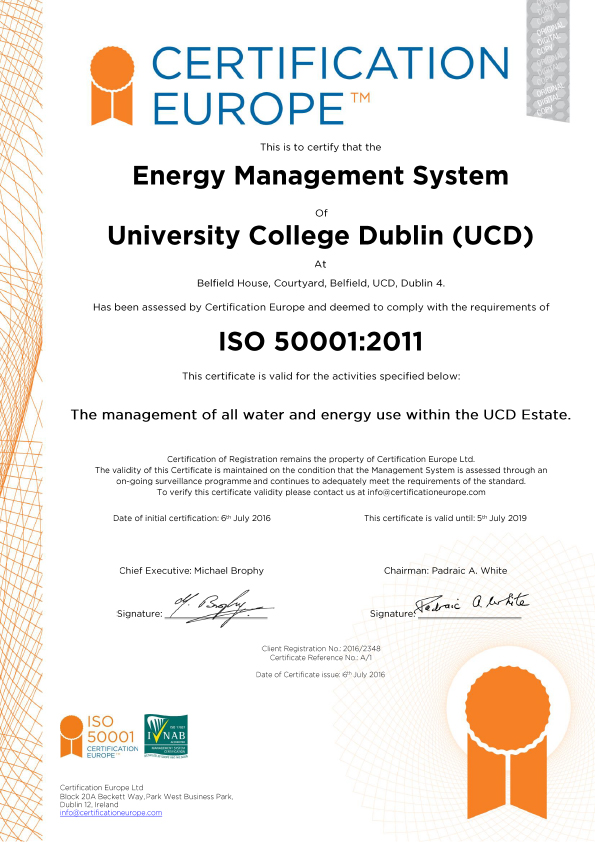UCD’s energy and water management system has recently been certified to ISO50001, the international standard for energy management. UCD is the first public sector organisation in Ireland to have achieved full organisational level certification to ISO50001 that encompasses both energy and water management.
The ISO50001 certification marks the most recent achievement of the University in the sphere of energy and water management. An energy monitoring and control system has been in place since the 1980s and has been developed since that time into an integrated, networked system that allows remote and automated monitoring and control of UCD’s lighting, HVAC (Heating, Ventilation and Air Conditioning) and on-site electricity generating systems, as well as monitoring and control of water systems. A dedicated Energy Unit was formed in 2003 in order to manage energy in the most economic and environmentally beneficial way.
 The Energy Unit has a delivered a number of innovative energy efficient and renewable technology projects in recent times, including a solar PV (photo-voltaic) system on the Engineering Building, LED lighting upgrades, pump, drive and boiler upgrades. Approximately 40% of the Belfield Campus electricity needs are met by CHP (Combined Heat and Power) which is a low-carbon means of providing both electricity and heating. A water infrastructure renewal and upgrade programme commenced in 2010/2011 which has delivered significant reductions in water usage across the campus. Where possible well-water is utilised for road cleaning and pitch irrigation. This avoids using potable water which has associated embodied energy due to the treatment process. Furthermore, rain-water is harvested from the roofs of a number of buildings and is used for toilet flushing, which again leads to less treated water usage.
The Energy Unit has a delivered a number of innovative energy efficient and renewable technology projects in recent times, including a solar PV (photo-voltaic) system on the Engineering Building, LED lighting upgrades, pump, drive and boiler upgrades. Approximately 40% of the Belfield Campus electricity needs are met by CHP (Combined Heat and Power) which is a low-carbon means of providing both electricity and heating. A water infrastructure renewal and upgrade programme commenced in 2010/2011 which has delivered significant reductions in water usage across the campus. Where possible well-water is utilised for road cleaning and pitch irrigation. This avoids using potable water which has associated embodied energy due to the treatment process. Furthermore, rain-water is harvested from the roofs of a number of buildings and is used for toilet flushing, which again leads to less treated water usage.
Energy and water efficiency has, and continues to be a central feature of the UCD capital development programme. At the time of completion, the UCD Roebuck Castle Residences was the largest Passive House structure in Ireland and the United Kingdom. Passive House buildings contain high levels of insulation and feature technologies such as heat recovery ventilation to deliver buildings that deliver high air quality and require significantly less energy to heat than typical buildings. The O’Brien Centre for Science is another development that leads the way in sustainable design, being the first educational building in Ireland to achieve a BREEAM Excellent rating.
This sustainability certification covers a number of different areas including energy, water, commuting, as well as health and well-being This building uses advanced systems such as solar PV, tri-generation CHP, Econet heat recovery, occupancy sensors, and automated opening vents amongst other technologies to ensure the buildings energy demands are met in the most efficient and sustainable way. The new Ashfield Student Residences are “A” rated energy buildings and feature a significant solar PV installation which dramatically reduces the buildings carbon footprint. Other sustainability features include a rain-water harvesting system and a “green roof” which controls water-run-off and acts as a biodiversity resource.

